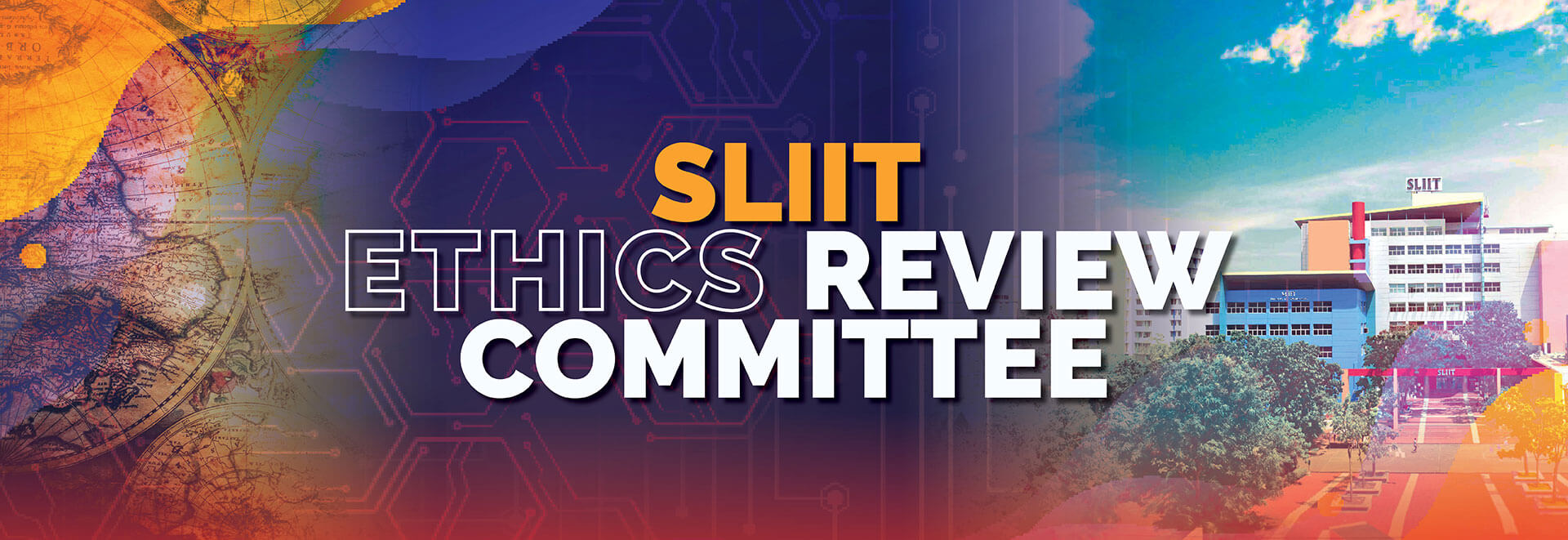
SLIIT Ethics Review Committee was established in year 2021 primarily to ethical considerations with regard to any proposed research involving, as participants, human beings and other living beings and to monitor integrity, profile of researchers and sources of research funding.
The main objectives of the Committee are to ensure that research proposals and other relevant instruments for the conduct of research are consistent with the guiding principles, values and norms of ethics relating to research proposed to be carried out on human and other living beings including animals, birds, plants, etc.
The Committee will evaluate and assess whether the said principles, values and norms have been followed in research carried out by researchers and institutions.
The Committee will also look at research integrity, profile of researchers and sources of research funding. The scope of work includes research to be undertaken by both staff and students of the Institute as well as by other persons engaged in Institute-led research projects.
Who can apply
Research work which needs ethical considerations with regard to any proposed research involving, as participants, human beings and other living beings including animals, birds, plants, etc.
How to apply
A person who is desirous of obtaining ethics clearance for his/her proposed research study or activity (‘the research’) from the SLIIT Ethics Review Committee shall make a written application to the Committee in the prescribed set of forms in OAS (http://oas.sliit.lk/)
Secretary,
Ethics Review Committee
Sri Lanka Institute of Information Technology
New Kandy Road, Malabe
Phone:
General: +94 7543456 Direct : +94 011 7543934
Email: SLIITERC@sliit.lk
Article 5 - Guiding Principles and Ethical Values
5.1 For the purpose of the role of the Committee, ethics means moral principles that control or influence a person’s behaviour. Ethical principles with regard to human beings are informed by recognizing the dignity, autonomy, non-coercion and non-harming of individual human beings as well as justice to them.
5.2 It is recognized that good ethical decisions are guided by considerations and concerns of one’s actions on others in a given circumstance and how the actions will affect and impact the others, including their autonomy, integrity, privacy, dignity, respect and reputation, among others. Respect for human dignity should be an uncompromising guiding principle informing the formulation and conduct of research.
5.3 The Committee shall ensure that any research proposal and other relevant instruments are consistent with and conformity to ethical norms and standards in that they are designed and formulated to uphold the dignity, safety and rights of research participants and that the research is to be conducted within an ethical and legal environment which is inherently capable of ensuring and respecting the dignity, privacy, confidentiality and safety of the participants.
5.4 The Committee shall ensure that the funding for the proposed research comes from legitimate and legally acceptable sources. The Committee should not approve of any research proposal the funding for which comes from illegitimate, illegal and other suspect sources.
5.5 The Committee shall be impartial, non-discriminatory, facilitative, supportive, progressive, and dedicated to the promotion of ethical standards in research.
5.6 The Committee shall ensure that research proposals and other instruments are scientifically sound in their formulation and are capable of being administered without compromising on their scientific quest for truth.
5.7 The Committee shall ensure that research work envisaged is within the purview of researcher’s expertise and not unduly infringing on non-related specialization without appropriate cooperation.
5.8 The Committee shall operate procedures no less rigorous than those suggested or required by relevant statutory or professional bodies.
5.9 At the same time, the Committee should be conscious that it should not be blatantly judgmental on quality and conclusions as many research projects are undertaken within a learning environment.
5.10 It will be desirable and prudent for the Committee to seek specialist advice on matters which may expose researchers to potential claims for damages or legal action for infringements of rights.
5.11 The Committee shall ensure that researchers do recognize that research involving human participants and/or their personal data may run ethical risks and they should be sensitive and be ever ready to neutralize or minimize such risks.
5.12 The Committee shall make researchers know that participants in research have the right to withdraw from research at any tie without adverse consequences to them.
Who can apply
Research Ethics Policy Framework governing the conduct of research on human and other living beings such as animals, birds, plants, etc
How to apply
An Applicant for ethics clearance shall submit a duly perfected application, in the prescribed form, with all the necessary attachments, at least two months before the proposed commencement of the research.
Application for Ethics Approval – Regular Procedure
Application for Ethics Approval – Expedited Procedure
Template for Research Proposal
Template for One-Page Summary of Research Proposal
Template for Information Sheet
Template for Declaration of Consent
Applicant for ethics clearance shall submit a duly perfected application, at least four weeks before the proposed commencement of the research.
Committee approval will provide the necessary feedback within 05 weeks from the application submission date.
The Committee will give, in writing, ethics clearance to the submitted research proposal, with or without revision or amendment, as the case may be. The letter conveying/granting ethics clearance will be addressed to the Applicant.
If the Committee is of opinion that the research proposal must be re-submitted after incorporating the amendments suggested by it, the Committee can convey that to the Applicant. The re-submitted proposal will be given ethics clearance provided it addresses the concerns and incorporate the suggested amendments to the satisfaction of the Committee.
The Committee may decline to grant ethics clearance if the research proposal contains features which go against the relevant Articles of the Charter of SLIIT Ethics Review Committee. And that the suggestions made by the Committee to make the Research Proposal consistent with the guiding principles and ethical values referred to in the Charter have not been suitably incorporated and the concerns expressed by the Committee have not been acted upon.
The Committee will give written reasons for declining to grant ethics clearance to a research proposal/activity.
An Applicant who is dissatisfied with any decision of the Committee may make a written request to the Committee to reconsider and review its decision.








 Inquire Now
Inquire Now
